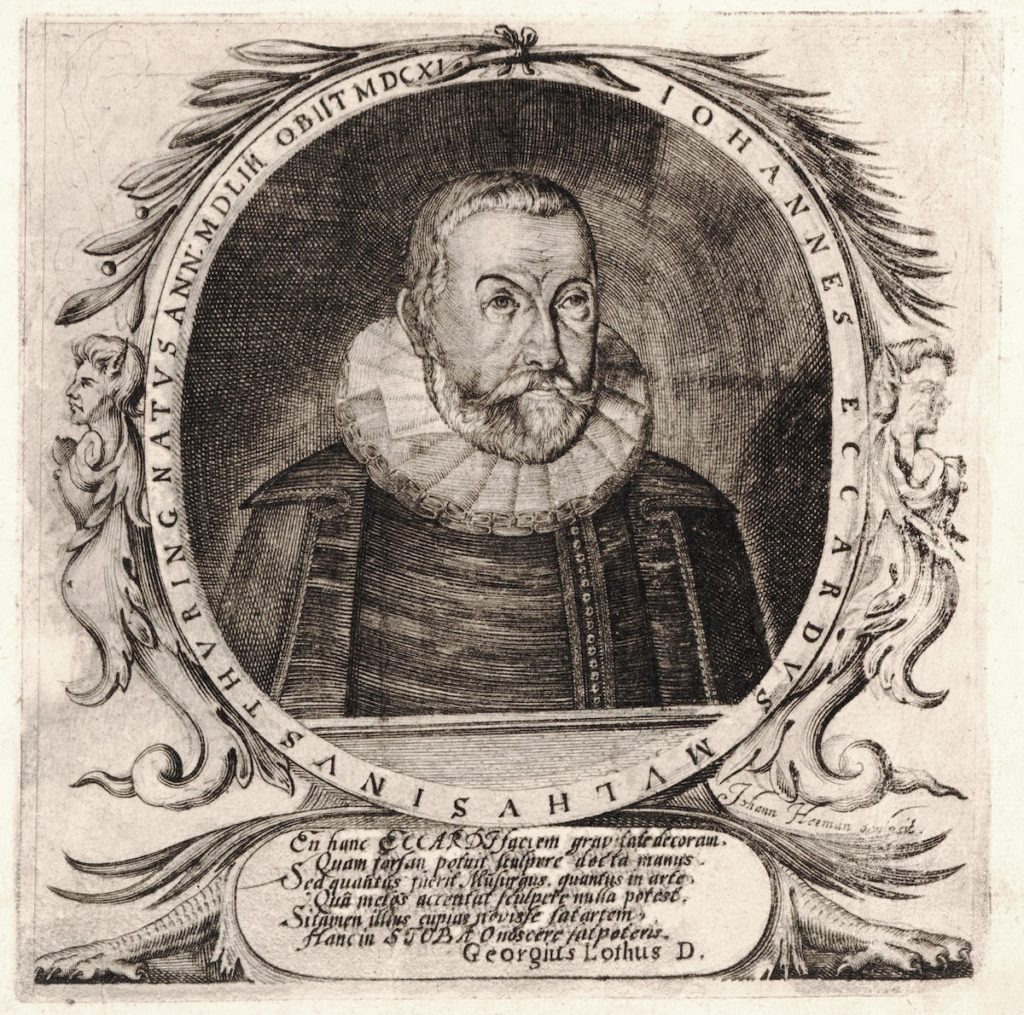
Johannes Eccard (1553-1611) was a master at setting Lutheran chorales in a way that made them musically beautiful and intricate while keeping the theological points of the texts foremost in the way he set the tune. He was born in Mühlhausen in 1553, and his first music teacher at the local school was Joachim a Burck, only seven years Eccard’s senior. Eccard would later join his childhood teacher as a peer and collaborate with him and the poet Ludwig Helmbold, who also lived in Mühlhausen. In 1567, Eccard began studies at the Kapellschule at Weimar under David Köller, where he also was a paid singer at the court chapel in Weimar.
In 1571, Eccard was a young man and was ready to seek out a true master of the day to gain more compositional knowledge. So he journeyed to Munich, where the widely acclaimed musician Orlando di Lasso was serving in the court of Duke Albrecht. Through involvement in the musical life of Munich, Eccard matured in his musical style and would always appreciate di Lasso’s role in his education, as shown by a poem dedicated to his teacher. Some twenty years after his studies in Munich, Eccard wrote in his own hand the words of a pre-existing poem as a tribute to di Lasso. It reads:
Musica dulcisono cælestia numina Cantu
Mulcere, et divos flectere diva potest.
Haec homines sparsos vinclo sociavit Amoris,
Primaque contiguas iussit habere domos.
Iure igitur divam facimus Cæloque locamus,
Ipsa sibi meritis struxit ad astra viam.
Iohannes Eccardus Mulhusinus, quondam præstantissimi Musici Orlandi Lassusii discipulus, scripsit hæc Regiomonti Borussorum Anno 93. 11 die Iulii.
Music with sweetly sounding Song can soothe the heavenly deities,
And the goddess can move the gods.
She has united divided men with the bond of Love
And was first to command them to have neighboring homes.
Rightly, therefore, we make her a goddess and place her in Heaven;
She herself by her merits has built up a path to the stars.
Johannes Eccard of Mühlhausen, formerly a student of the most excellent musician Orlando di Lasso, wrote this at Königsberg, Prussia, in the year [15]93, the 11th day of July.
Of course, as a Christian, Eccard did not actually believe that music was a goddess, but it was common at the time to set such Renaissance texts to music and to speak in classical terms about music’s power. Eccard was brilliant at using the power of music for the praise of Christ, as seen by the many hymn-based choral works that mark his career.
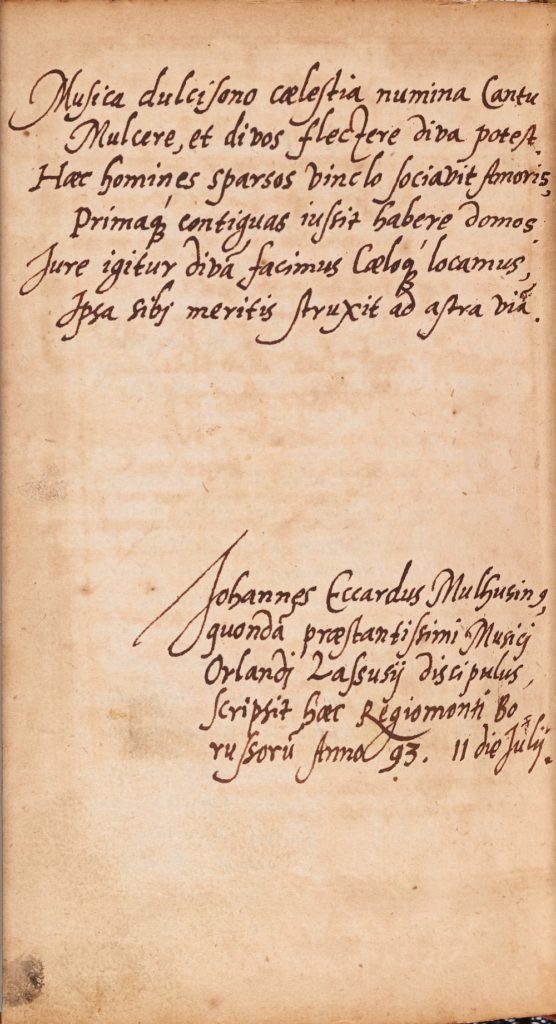
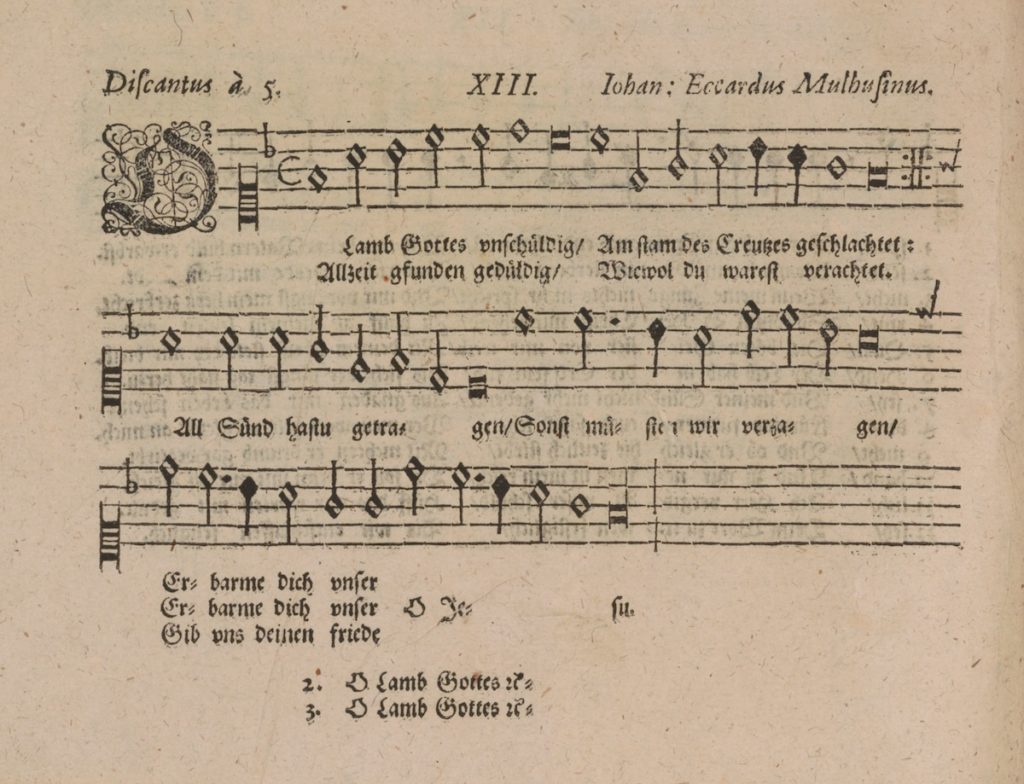
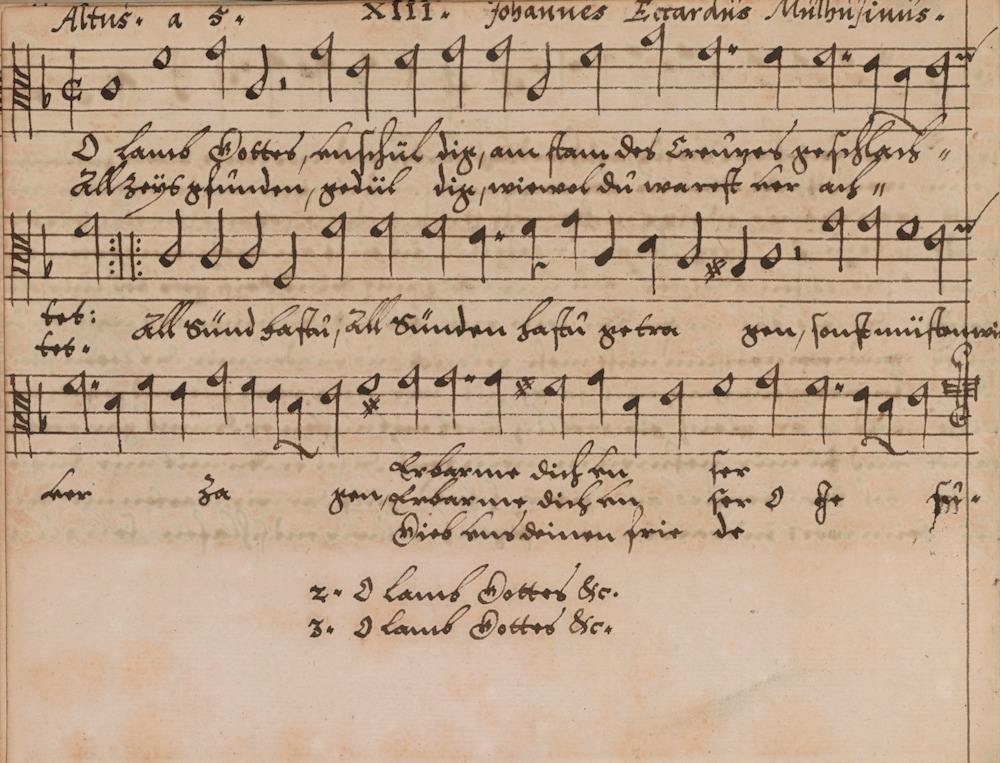
After his formative years of study in Munich, Eccard returned to his hometown in 1574 and began producing a wide array of choral compositions. He collaborated closely with his old teacher Joachim a Burck, publishing several collections of homophonic Latin and German hymns. Around this time he also received a position of some status, working as the household musician of the influential and wealthy Fugger family in Augsburg. The major works he wrote during this period were dedicated to his patrons, the brothers Hans, Marcus, and Jakob Fugger, and include his Newe deutsche Lieder of 1578. This collection includes twelve partsongs for four voices and twelve pieces for five voices with a madrigal style. Eccard would become especially associated with works written for five voices, which provided more versatility than only four voices, allowing him to add more polyphonic motion in his chorale settings.
His next position was in Königsberg as the Vice-Kapellmeister of the court of Prince Georg Friedrich of Preussen-Ansbach, where he would serve for twenty-eight years. He was eventually promoted to the position of Kapellmeister in 1604. It was in Königsberg that Eccard wrote most of his works and taught students in his style, notably Johann Stobӓus, who would go on to teach his own students, including Heinrich Albert, who was the cousin of the prolific composer Heinrich Schütz. While in Königsberg, Eccard published Geistliche Leider (1597), a collection of five-part motets based on chorales, in which Eccard joined beloved hymn tunes with artistic settings that lived up to the highest compositional standards. In 1608, Eccard was summoned to the court of Elector Joachim Friedrich of Brandenburg, but this new patron died the same month that Eccard arrived. Thankfully, the successor, Elector Johann Sigismond, saw the value of Eccard’s abilities and continued supporting him in the new position, for Eccard’s fame was by this time quite widespread. Eccard’s time serving the Elector of Brandenburg was short, for he died three years later in 1611.
Eccard composed some 280 vocal works, which have been admired and studied by many due to Eccard’s ability to seamlessly set hymn tunes in a richly-woven yet pious fashion. He differs from other composers of the day by actually including the accidentals he intended in his music and by clearly indicating which notes corresponded to certain syllables of the text. Eccard was such a highly esteemed composer that his setting of “Ein feste Burg” [A Mighty Fortress] was held by the Germans to be a sort of national anthem before the beginning of World War I. As an example of his compositional ability, in his piece “Altum alij sapient” the fifth vocal part consists of only seven notes which repeat seven times, while the other four parts surround this anchoring theme with brilliant, complementary vocal lines. Although much of his secular music was lost in World War II, many of Eccard’s sacred compositions remain, as these pieces were recognized as a true gift to the church and were frequently included in other collections.
Sources: Magen Solomon, “Johannes Eccard and the Late Sixteenth-Century German Partsong,” American Choral Review 50, n0. 2 (Summer/Fall 2008). Peter Bergquist, “A Tribute from Johannes Eccard to Orlando Di Lasso at Concordia Seminary, St. Louis,” Notes 60, no. 3 (March 2004).
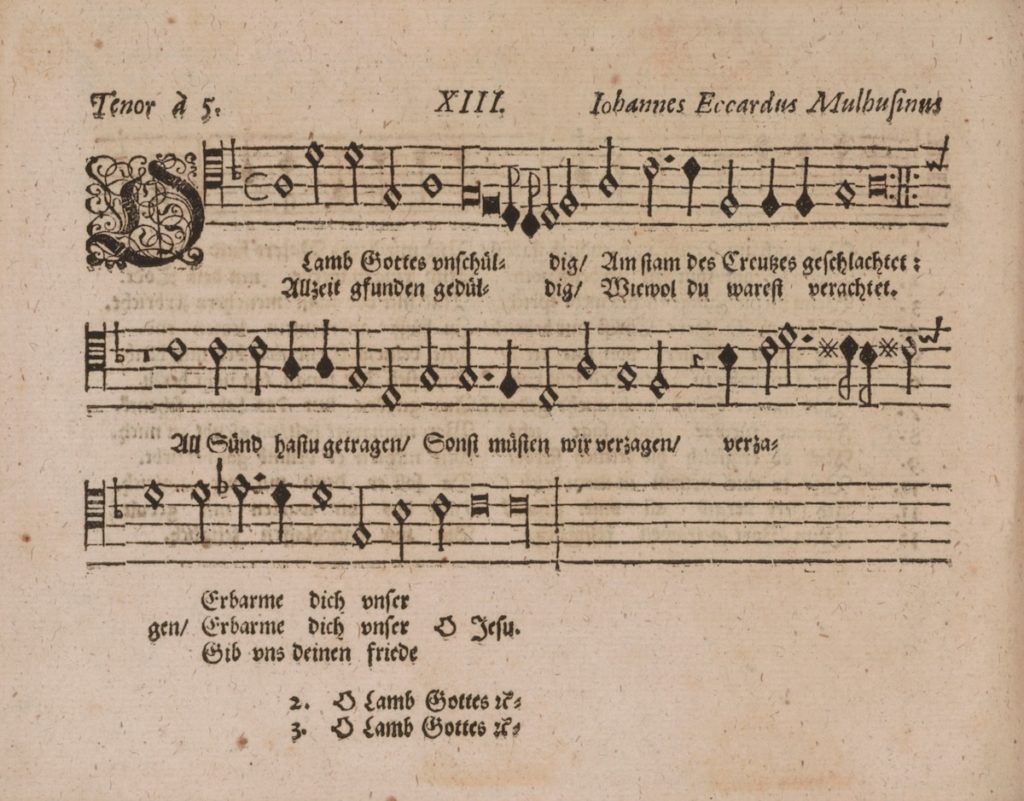
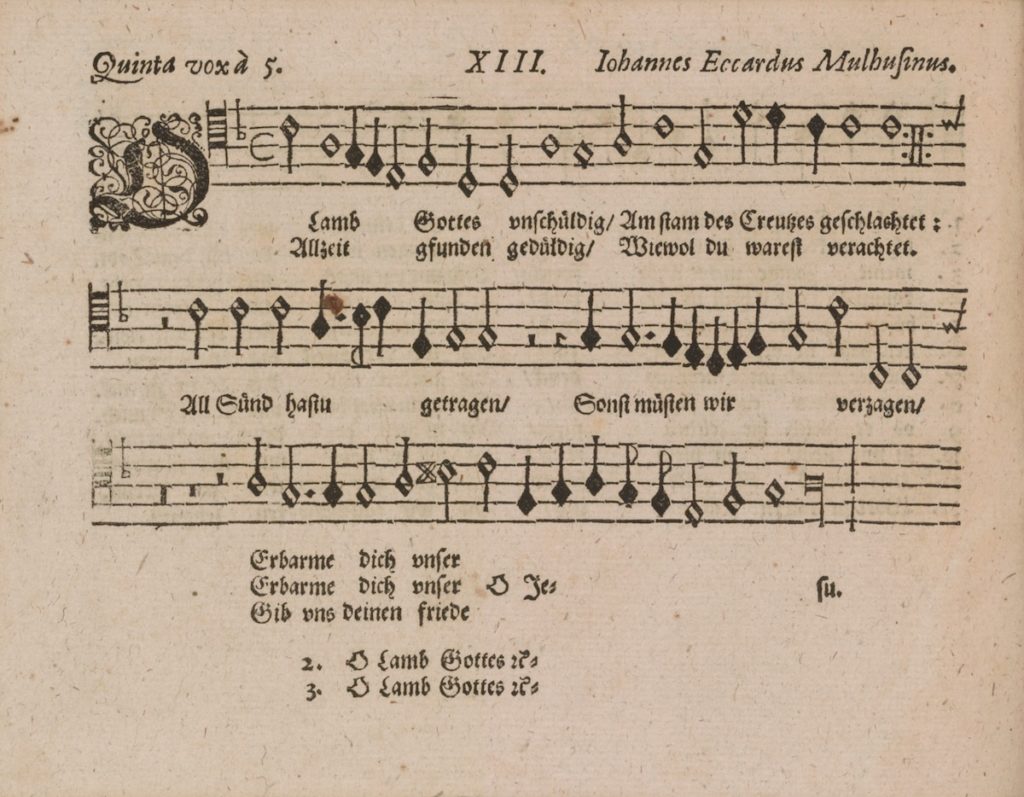
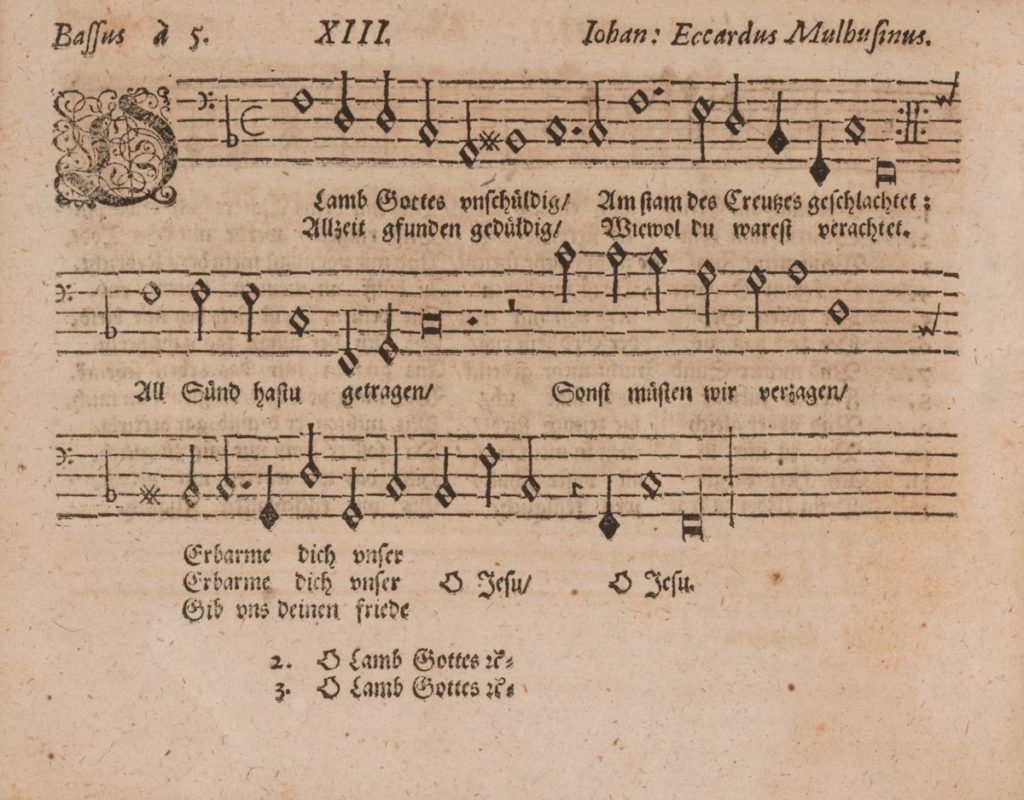
Arrangements by Johannes Eccard
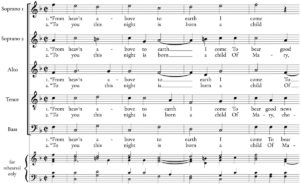
From Heaven Above to Earth I Come
“From Heaven Above to Earth I Come” (Vom Himmel hoch, da komm ich her), text by Martin Luther (1535). Tune attr. Martin Luther (1535). Setting by Johannes Eccard (1597). Polyphonic, SSATB.

I Know My Faith Is Founded
“I Know My Faith Is Founded” (Ich weiß, an wen ich gläube), text by Erdmann Neumeister (1718). Tune (Nun lob, mein Seel, den Herren) by Hans Kugelmann (1540). Setting by Johannes Eccard (1597), originally for text Nun lob, mein Seel, den Herren. Polyphonic, SATTB.
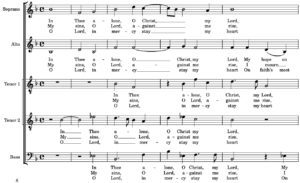
In Thee Alone, O Christ, My Lord
“In Thee Alone, O Christ, My Lord” (Allein zu dir), text by Johannes Schneesing (1540). Setting by Johannes Eccard (1597). Polyphonic, SATTB.

Lamb of God, Pure and Holy
“Lamb of God, Pure and Holy” (O Lamm Gottes, unschuldig), text and tune by Nikolaus Decius (1531). Setting by Johannes Eccard (1597). Polyphonic, SATTB.
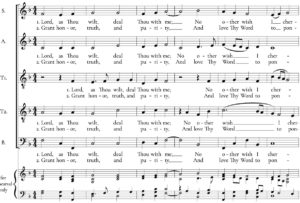
Lord, As Thou Wilt, Deal Thou with Me
“Lord, As Thou Wilt, Deal Thou with Me” (Herr, wie du willst, so schick’s mit mir), text by Kaspar Bienemann (1574). Setting by Johannes Eccard (1597). Polyphonic, SATTB.
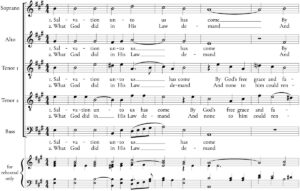
Salvation unto Us Has Come
“Salvation unto Us Has Come” (Es ist das Heil uns kommen her), text by Paul Speratus (1524). Setting by Johannes Eccard (1597). Polyphonic, SATTB.


